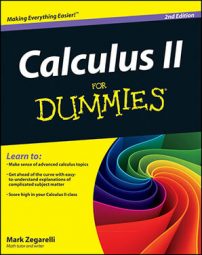The nth-term test for divergence is a very important test, as it enables you to identify lots of series as divergent. Fortunately, it’s also very easy to use.
If the limit of sequence {an} doesn’t equal 0, then the series ∑ an is divergent.
To show you why this test works, the following sequence meets the necessary condition — that is, a sequence that doesn’t approach 0:
Notice that the limit of the sequence is 1 rather than 0. So here’s the related series:
Because this series is the sum of an infinite number of terms that are very close to 1, it naturally produces an infinite sum, so it’s divergent.
The fact that the limit of a sequence {an} equals 0 doesn’t necessarily imply that the series ∑ an is convergent.
For example, the harmonic sequence
approaches 0, but the harmonic series
is divergent.
When testing for convergence or divergence, always perform the nth-term test first. It’s a simple test, and plenty of teachers test for it on exams because it’s easy to grade but still catches the unwary student. Remember: If the defining sequence of a series doesn’t approach 0, the series diverges; otherwise, you need to move on to other tests.

